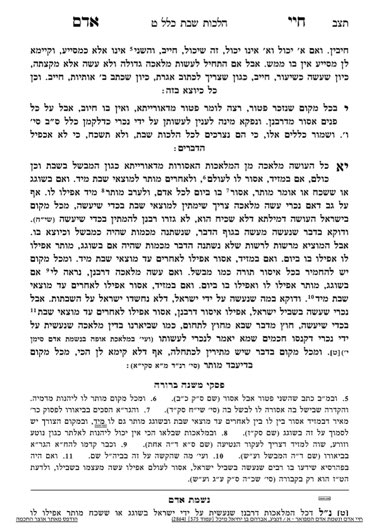Sponsorships for the upcoming Klalim, which discuss the 39 melachos of Shabbos, are available. Please contact Rabbi Reingold for more information at rabbireingold@gmail.com or 301.996.5910
We are continuing in siman 11, discussing the concept of maaseh Shabbos. Have finished the Klal, and have a few other points to clarify.
We discussed the difference between the maaseh Shabbos of a Jew and a non-Jew regarding bichdei sheyaasu. We explained that, when it comes to a non-Jew, people look at the non-Jew’s work as more lenient, and therefore people may be more inclined to ask a non-Jew so that they can gain the benefit immediately after Shabbos. When it comes to the maaseh Shabbos of a Jew, we assume that a Jew will be more hesitant to ask another Jew to perform melacha, and the Jew being asked will be hesitant to perform the work, so there was no need to impose bichdei sheyaasu
.
The question comes up regarding Jews who are mechalel Shabbos. Even if we give them the status of a tinok shenishba, in the sense that they are not assumed to be performing the maaseh Shabbos b’meizid, the concern that another may try to benefit from their maaseh Shabbos immediately after Shabbos would apply.
There are definitely poskim who are concerned for this possibility, and hold that one must wait bichdei sheyaasu on their work. We find in halacha that, miderabanan, one who is not following halacha receives the status of a non-Jew in certain situations, such as in terms of their wine. Thus, the Pri Megadim paskens that one must wait bichdei sheyaasu on such a Jew’s maaseh Shabbos.
We learned that when a Jew creates maaseh Shabbos b’meizid, it is assur to the person himself forever, and others may benefit immediately after Shabbos. Regarding members of his household, the Mishnah Berurah (318:sk5) says that even the person for whom the food was cooked b’meizid may benefit from the food immediately after Shabbos. This halacha is based on the Magen Avraham, who says that the issur of maaseh Shabbos is only imposed on the person who transgressed Shabbos themselves, not those who benefit.
However, this understanding of the Magen Avraham is debatable. The Pri Megadim understands differently, and, as a result, some poskim understand that the members of one’s household should be machmir and should not benefit from the maaseh Shabbos. Practically, the Mishnah Berurah is meikil.
If a person specifically asked a Jew (or non-Jew) to perform melacha for him, the person who asked cannot benefit from the melacha, as it is considered a form of chilul Shabbos b’meizid. Even if the person who performed the melacha acted b’shogeig, the person who asked is acting b’meizid in terms of the chilul Shabbos, so no one can benefit from the maaseh Shabbos.
The Ksav Sofer writes that the leniency of the Magen Avraham, that one can benefit from the melacha of a Jew immediately after Shabbos, only applies to a Jew who is mechalel Shabbos on an irregular basis. If the person is mechalel Shabbos regularly for the purpose of his business, the Magen Avraham will agree that one cannot benefit from that melacha forever, not even bichdei sheyaasu. He explains that benefitting from that melacha is encouraging the chilul Shabbos, since the chilul Shabbos is the result of having willing customers. Even if the owner did not have specific customers in mind, it is still assur, because his intent was for whoever will eventually purchase the item.
Although some poskim disagree with the Ksav Sofer, it is the approach of many poskim. Thus, benefitting from chilul Shabbos performed b’meizid will be assur forever.
If one is unsure whether the item was produced on Shabbos or during the week, one can go based on rov (majority) and assume it was not produced on Shabbos. We have learned that since the issur of maaseh Shabbos is derabanan, in cases of safeik, one may be lenient. That being said, if people refusing to buy from the company will stop the company from working on Shabbos, buying from the company is facilitating chilul Shabbos, so there would be elements of lifnei iver, mesayeiah and chilul Hashem to buy from them.
Summary
- The maaseh Shabbos of a Jew who is mechalel Shabbos is treated like the maaseh Shabbos of a non-Jew.
- Some poskim consider members of one’s household as the person themselves, but the Mishnah Berurah is meikil to consider them as others in regards to benefitting from maaseh Shabbos.
- If one specifically asks a Jew to perform a melacha, the person who asked has the status of a meizid and can never benefit from the melacha.
- The Ksav Sofer holds that one can never benefit from the melacha of a Jew who regularly is mechalel Shabbos.



